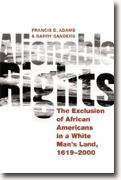Francis D. Adams & Barry Sanders
book reviews:
· general fiction
· chick lit/romance
· sci-fi/fantasy
· graphic novels
· nonfiction
· audio books
· author interviews
· children's books @
curledupkids.com
· DVD reviews @
curledupdvd.com
newsletter
win books
buy online
links
home
for authors
& publishers
for reviewers

 |
Alienable Rights: The Exclusion of African Americans in a White Man's Land, 1619-2000 Francis D. Adams & Barry Sanders HarperCollins Hardcover 368 pages November 2003 |
|
The title tells it all. Despite the rhetoric and despite our wish that it not be so, White America has consistently chosen the exclusion, when possible, of Black America, and when exclusion proved impossible, then White America looked to legal remedies, then to social machination, and when all else failed, to illegal tactics and thuggery.
..."Inhabitants of this Province being Christians (Slaves excepted) shall have and enjoy such rights liberties immunities priveledges and free customs...as any naturall born subject of England."Paradoxically, as authors Adams and Sanders rightly point out, there was a sense that "God had truly selected the America to lead the struggle for human liberty and provide an example for oppressed people everywhere." This was the revolution in "the hearts and the minds of the people," a phrase coined by John Adams himself. Therefore, as we all recognize, it was that much more difficult for these erudite, religious men, feeling the fire of fate in their every action, to make peace with the notion of slavery. Nearly all the founding fathers knew, in their best "hearts and minds" that slavery was godless and would fall, or be the downfall of those who practiced it. But they did nothing to stem the engulfing tide. Then came the Civil War and a nation divided, a nation that couldn't and wouldn't stand unless blood was shed. Lincoln proposed the emancipation of slaves, finally, as a "strategic act aimed at prosecuting the war rather than a moral choice in favor of black freedom." There was a movement to send blacks to Liberia, the results of which today scream across the headlines. There was every dodge imaginable to stave off the inevitable - the recognition, in law and in social and moral fact, of the human equality of all America's people. But the dodges continued. In the face of black enfranchisement, "state election officials chose...a series of race-neutral qualifications and voting procedures that effectively excluded blacks from casting their ballots..." These included poll taxes to be paid as much as a year in advance "with interest accruing on the unpaid amounts." If all that wasn't sufficient, there was fear, with the Klan as its long and brutal arm. For every Medgar Evers or Martin Luther King seeking power for his people, there was a George Wallace or a George Bush, newly elected in Texas, wielding political clout and willing to undercut any efforts to make the laws stick. When the laws were made to stick, there was another subtle maneuver, defined best by Ronald Reagan: "never speak ill of blacks in public - and defend yourself against charges of prejudice by taking shelter behind that old rampart, individual freedom." Which is where, at this time, the matter rests. An uneasy truce and a feeble appearance of intent. A record of shameful loss and a promise of more to come. Only on an individual basis, where we meet in person and in brief touching interludes, is there much real racial betterment going on in America. We look for a last, hopeful chapter but find none. © 2004 by Barbara Bamberger Scott for Curled Up With a Good Book |
|
|
|
 Click here to learn more about this month's sponsor! |
|
| fiction · sf/f · comic books · nonfiction · audio newsletter · free book contest · buy books online review index · links · · authors & publishers reviewers |
|
| site by ELBO Computing Resources, Inc. | |
 The authors have put this ugly story in a long scholarly timeframe, facts at their fingertips. It will strike a note of agreement with all but the most hardened and radical opponents of its views. From its earliest days, America was a blancophilic society, as evidenced in such early statutes as this from Maryland in 1639:
The authors have put this ugly story in a long scholarly timeframe, facts at their fingertips. It will strike a note of agreement with all but the most hardened and radical opponents of its views. From its earliest days, America was a blancophilic society, as evidenced in such early statutes as this from Maryland in 1639: